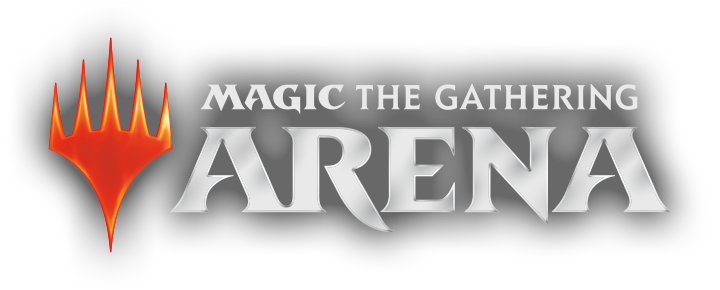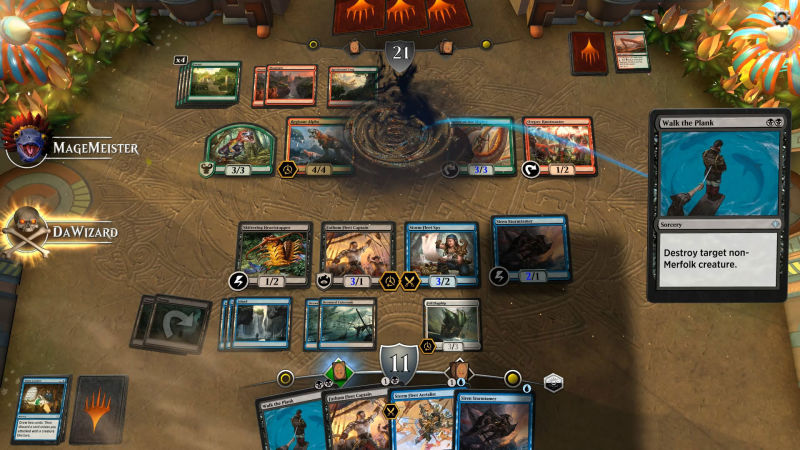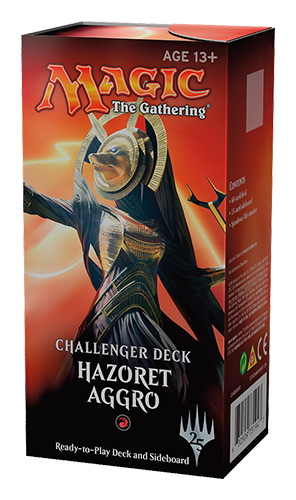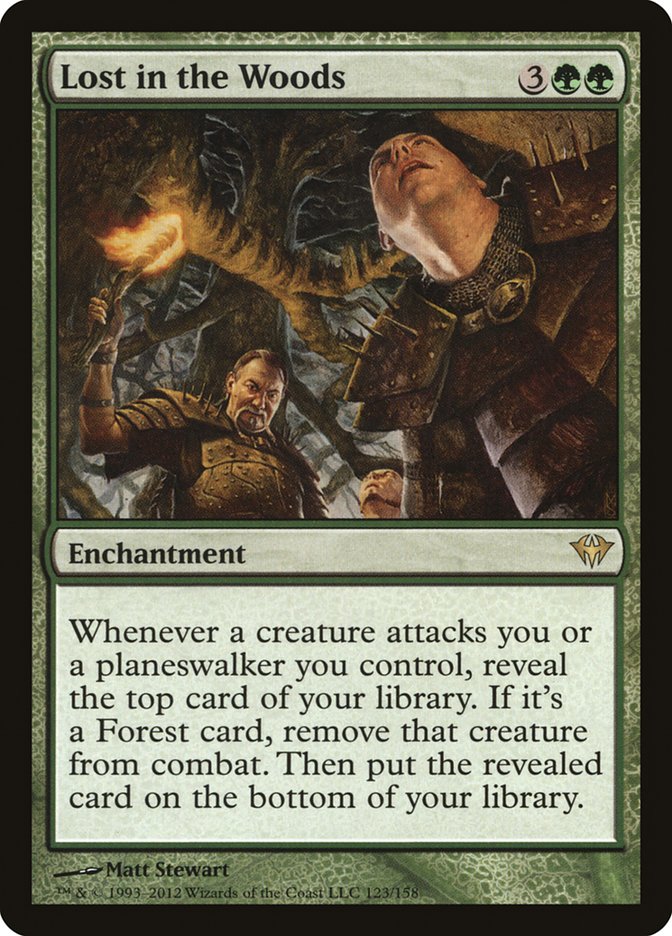“Magic Arena is stupid, it just looks like Hearthstone!”
“Why would I ever want to play Brawl when I could just play Commander?”
“Challenger decks make getting great mythics like Hazoret the Fervent too
easy… I had to pay full price!”
Y’all gotta just relax.
Magic players often have a difficult time seeing the forest for the trees,
so we need to have a bit of a chat about what’s been coming out of Renton,
WA lately. We’re talking new formats, new products, and most importantly,
hope for the online Magic experience that we’ve wanted for the last decade.
However, most of this is bigger than just you or me.
Let’s talk about retention and acquisition.
Retention
re·ten·tion
noun
1. The continued possession, use, or control of something.
2. The fact of keeping something in one’s memory.
3. Keeping someone addicted to an expansive and ever changing card
game.
Magic as a game has always been excellent at retention. Once Magic gets its
hooks into someone they’ll almost always have the bug for life, even if
they do take prolonged breaks for whatever reasons life throws at them.
It’s called “cardboard crack” for a reason, and players’ devotion to the
game is so strong it can sometimes border on obsessive.
This makes a lot of sense as Magic is both engrossing and expensive,
offering endless things to think about as well as substantial monetary
investment. Finishing a Modern deck or Legacy deck is often as costly as a
down payment on a new car, to say nothing about a fully blinged out
Commander or Legacy deck, and that sort of investment is neither made nor
parted with lightly.
When we see products like Masters Edition sets, Commander decks, and
special “bling” reprint products like From the Vault foil sets or the new
Signature Spellbook sets, it’s very clear that these products are designed
for the established and entrenched player. No new player is spending $10 on
a booster pack for a format they hardly know exists, nor are they going to
care about foils or jumping into a very complex Commander format.
It’s good that these products exist, as there’s obviously a market for them
and they make people happy (although, man, am I fatigued on Masters sets),
but these products are only part of a larger picture.
Acquisition
ak-wuh-zish-uhn
noun
1. The act of acquiring or gaining possession
2. Something acquired; addition
3. The act of bringing new players into your game
Put bluntly, the last few years have been awful for Magic for acquisition.
Let’s take a look at the major roadblocks.
-
Standard has been between “not great” and “godawful” up until very
recently, with not only unbalanced/unfun gameplay but also an
unprecedented four different rounds of bannings. It’s hard to
understate how destructive bannings are to the confidence of the
more casual FNM player, so I’ll just put it in overbearing bold
text:
Bannings are extremely destructive to the confidence of the more casual
FNM player, as well as very damaging to the game as a whole.
-
Modern, a format with humble beginnings and a somewhat shaky track
record, has come on as the current most popular format. Modern has
been in a fantastic place so this makes a lot of sense, and as a
result there’s a big draw for invested players to buy into their
deck, learn it, and not need to worry about rotation. However,
Modern is not a great entry point for newer players; it is a
mountain of information to take in, complicated and confusing to
play, and expensive to buy into. -
Featuring the complexity of Modern and Legacy, as well as the price
tag, Commander is currently the casual format of choice. It’s also
just as daunting as Modern from a gameplay perspective, perhaps
more so once a newer player gets thrown into a huge six-person
game. Like Modern and Legacy, it also carries a hefty price tag if
you want to be remotely competitive. -
Once one of the most popular ways to play, Limited has really
dropped off. The reasons for this seem subtle, but I suspect it has
to do with how unexciting Limited coverage is, consequently how it
is completely absent from SCG Tour coverage, and how it only really
seems to matter for high level players playing in Pro Tours and
Grand Prix. Limited is one of the best ways for newer players to
get into the game, as it completely removes needing a collection
from the game’s requirements.
As a result of how bad Standard has been (with perhaps help from
disinterest in limited and lame promos), FNM has been having a rough go of
it as well. Stories of Standard FNMs not even getting enough players to
fire have been common, and while some stores still run successful Modern
events there’s a certain feeling of stagnation around the game right now.
The most popular formats are Modern and Commander, which are both
exceedingly hostile to newer players for a variety of reasons, and the
typical entry points of Standard and Limited are currently bottoming out –
this is not a good situation.
If you’re a deeply entrenched player (which is likely true if you are here
on the world’s best Magic website, reading articles), you may be wondering
why this should matter to you. You go to tournaments; you have Legacy,
Modern, Commander, and Standard decks; you play leagues on Magic Online;
Magic is great! Well, the next time you complain about 11-4 not cashing a
Grand Prix because the prize pool is too small, or a Magic Online event
that crashes because they aren’t allocating the resources to work on it, or
that tournaments won’t come to your area, or even that your weekly Standard
event won’t fire, think about why the health of our game matters.
Thankfully, Wizards of the Coast has a number of new offerings on the
horizon that seem very well suited towards acquisition.
The biggest of course, is Magic Arena:

It’s no secret that Hearthstone is astoundingly popular and Magic Online
looks like Minesweeper in comparison. Serious players have dealt with Magic
Online for years, because frankly Magic is amazing and we need to play and
practice for events. However, a large number of players have chosen to not
even bother with Magic Online, and if you’re not already an entrenched
player forget about it. Magic Online will send you running for the hills.
Enter Magic: Arena.
Yes, Magic: Arena looks like Hearthstone, and no, that’s not a bad thing.
There’s a reason Hearthstone has been so wildly successful – it looks and
plays like a game! It’s fun, intuitive, and entertaining, which is
something that makes it easy for new players to get drawn in.
Magic: Arena, like Duels of the Planeswalkers before it, seems very well
suited as a game. The free-to-play model makes it extremely accessible,
with quests and rewards giving you a reason to keep playing and try
different things. Rather than leveling up or finding cool loot, you get to
keep opening packs and improving your collection and deck. This is simple,
fun, and attention grabbing for new players as well as players who may have
abandoned the game for whatever reason in the past. Who doesn’t fondly
remember their early days playing Magic? Playing half the cards you own,
ripping open booster packs to try and get new exciting cards – it’s kitchen
table Magic to the core, not “should I play three or four copies of The
Scarab God in U/B Midrange?”
Casual play is much more popular than most tournament players realize, and
it’s no surprise that Magic experienced a ton of growth during the run of
Duels of the Planeswalkers. The game’s simple and appealing interface as
well as accessibility on mobile devices and Xbox provided the Magic
experience to many new or lapsed players in a fun and unique way. Magic
Arena looks to do the same thing, but also takes on the monumental task of
reproducing serious Magic as well.
Ah yes, that’s where we – the serious and entrenched tournament players –
re-enter the equation.

So far the Magic Arena Beta has impressed. The UI is fairly intuitive and
easy to use, and the in-game play is much crisper than Magic Online while
providing a good amount of flair and effects. Not everyone is going to need
the bells and whistles, but for the most part the game seems to play well.
The stops are there, you can tap your mana the way you want to when needed,
and while the UI takes shortcuts when it can to speed the game up, it seems
to be fully functional.
The problem is that most serious tournament players aren’t looking for a
sweet new game to play; we already have Standard, Modern, and Legacy, and
we want to play the same format and decks they play at their local card
shop or on weekends and big tournaments. While the economic system is still
being tested and figured out, the current model leaves us with no way to
trade or acquire cards from outside sources that aren’t the game’s store or
achievement systems. There are unique workarounds like automatically
dusting every card you open past four for more cards and special “wild
cards” that can become cards of any rarity, but the grind is certainly
real.
This brings us to the true crux of Magic Arena; without the liquidity of a
secondary market where players can quickly buy the cards they need for the
deck they want to play with the comfort of knowing they can sell them back
to buy other cards, are players going to sign on? Grinding out achievements
is fun if that is what you’re into, but the idea of sinking a bunch of
money in to Magic Arena just so you can play the decks you want to play
knowing full well that money is never coming back is a hard pill to
swallow.
Magic Arena seems fantastic for Magic as a whole. It’s one of the best
acquisition tools the game has perhaps ever seen, and it has a major
potential to be the huge step forward we’ve always wanted Magic Online to
be. It’s easy on the eyes, fairly intuitive to use, and a great game
overall. It also raises very real concerns for more serious players who
simply want to play and stream the decks they want to play without the fuss
(or spending an arm and a leg).
For now I’m still playing Magic Online, but color me cautiously optimistic.
The next great acquisition tool is the newly announced Brawl format.
Brawl is essentially just “Standard Commander,” with the major difference
being that the decks are 60 cards instead of 100. Commander is perhaps the
most beloved casual format, which has caused some players to react
negatively to the announcement of Brawl.
Don’t let this be you, as it is incredibly shortsighted.
Commander isn’t going anywhere. It’s one of the most popular formats among
entrenched players and has a long and storied history. Brawl isn’t designed
to be a new Commander; it’s designed to be a Commander format that is
accessible to newer players: Retention versus acquisition.
Brawl will be a very easy format for newer players to get started with. The
Standard card pool is already fairly inexpensive, and even the expensive
cards will either only demand one copy or just not be missed. Brawl is a
way to breathe new life into FNMs and local game stores everywhere,
creating a new market for underappreciated cards and setting a new
generation of players off on the path towards being a serious Magic player.
Just like the Standard players of today are the Modern and Legacy players
of tomorrow, the Brawl players of today are the Commander players of
tomorrow.
The only realistic downsides to the format are that it is going to be a bit
reliant on what legends are available in non-legend focused sets and the
mana fixing can be a bit rough with the singleton rules. Otherwise Brawl
looks a home run on all fronts, acquisition most important of all.
I say this as someone who is not likely to ever build a Brawl deck or even
play a game of Brawl – Brawl is a brilliant idea.
Our third and final great acquisition piece is the new Standard Challenger
decks.

Perhaps the most obvious of the bunch, the new Standard Challenger decks
give newer players a fairly competitive Standard deck right out of the box.
There’s really not too much to say about these other than that they’re a
terrific and straightforward tool to get newer players right into a
Standard FNM with a low, simple upfront cost that will give them a taste of
what playing tournament Magic is really like.
In the past preconstructed decks were often woefully underpowered, and one
can only imagine what it would be like to be a new player being thrown to
the wolves of a competitive FNM with essentially a butter knife and a
prayer. These new Challenger decks give new players a fighting chance, a
well as a much higher probably of coming back for more next week.
What’s the cost? Mildly devaluing your Standard rares that are going to
devalue when they rotate anyway? A slight hit to your ego when a new player
ramshackles you with a turn 4 Hazoret the Fervent two games in a row? Less
open table space for your mid-round Taco Bell spread at your FNM?
Challenge decks are a no-brainer.
Just Because It’s Not For You Doesn’t Mean It’s Bad
The most important thing to recognize about all of these products is that,
with the exception of what they want Magic Arena to eventually be, these
products aren’t likely for you if you’re already very serious about Magic.
In fact, they may actually slightly decrease your experience playing the
game if you’re some sort of dogmatic Commander zealot or really don’t like
meeting new people at your FNM. But even if it’s not directly for you, a
rising tide lifts all ships. The better and healthier Magic is, and yes,
the more money Wizards of the Coast makes, the better Magic is going to be
for everyone.
I’m not the target market for these products, but I couldn’t be happier not
only that they exist, but that Wizards of the Coast is starting to notice
how important products like them really are.
And let’s face it: Magic already has its hooks in you- you ain’t going
anywhere, and that’s retention at it’s finest.



